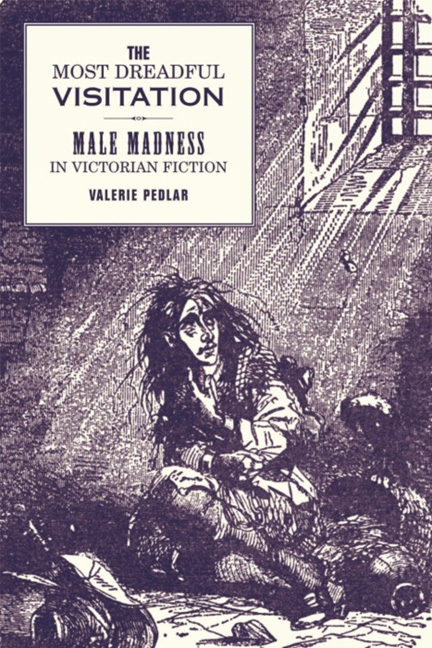Book contents
- Frontmatter
- Dedication
- Contents
- Acknowledgements
- Introduction
- 1 Insurrection and Imagination: Idiocy and Barnaby Rudge
- 2 Thwarted Lovers: Basil and Maud
- 3 Wrongful Confinement, Sensationalism and Hard Cash
- 4 Madness and Marriage
- 5 The Zoophagus Maniac: Madness and Degeneracy in Dracula
- Conclusion
- Bibliography
- Index
5 - The Zoophagus Maniac: Madness and Degeneracy in Dracula
- Frontmatter
- Dedication
- Contents
- Acknowledgements
- Introduction
- 1 Insurrection and Imagination: Idiocy and Barnaby Rudge
- 2 Thwarted Lovers: Basil and Maud
- 3 Wrongful Confinement, Sensationalism and Hard Cash
- 4 Madness and Marriage
- 5 The Zoophagus Maniac: Madness and Degeneracy in Dracula
- Conclusion
- Bibliography
- Index
Summary
But however silly a term fin-de-siècle may be, the mental constitution which it indicates is actually present in influential circles. The disposition of the times is curiously confused, a compound of feverish restlessness and blunted discouragement, of fearful presage and hang-dog renunciation. The prevalent feeling is that of imminent perdition and extinction. Fin-de-siècle is at once a confession and a complaint. The old Northern faith contained the fearsome doctrine of the Dusk of the Gods. In our days there have arisen in more highlydeveloped minds vague qualms of a Dusk of the Nations, in which all suns and all stars are gradually waning, and mankind with all its institutions and creations is perishing in the midst of a dying world.
Max Nordau's evocation of the spirit of the age at the end of the nineteenth century caused a sensation when it was first published. He tapped into a rich vein of commentary in which cultural and moral criticism were intertwined, as the trial of Oscar Wilde so poignantly demonstrates. Nordau's journalistic flamboyance feeds off the very culture it attacks. For Nordau, inspired by the work of Lombroso and Morel, the period was one of degeneration, which he defines as a disease affiliated with hysteria. Both are associated with the nervousness that is part of life in modern industrial society. Like his precursors, Nordau believes that degeneracy is recognised by physical ‘stigmata’: ‘Science, however, has found, together with these physical stigmata, others of a mental order, which betoken degeneracy quite as clearly as the former.’ Such degenerates occupy a ‘borderland between reason and pronounced madness’, and like all degenerates ‘lack a sense of morality and of right and wrong’. Following the lead of the psychologist, Henry Maudsley, Nordau characterises the extreme position as one of moral insanity, which shared with degeneracy the characteristics of ‘egoism’ and ‘impulsiveness’, or lack of self-control.
Although the idea of degeneration was originally a biological concept, it adapted easily to more figurative usage, providing a scientific foundation for the moral panic at the end of the century. In the deviations from and perversions of what was seen as normal, society seemed to be no longer progressing, but regressing; it was both hurtling forward to disintegration and retreating into primitivism.
- Type
- Chapter
- Information
- The Most Dreadful VisitationMale Madness in Victorian Fiction, pp. 134 - 158Publisher: Liverpool University PressPrint publication year: 2006



